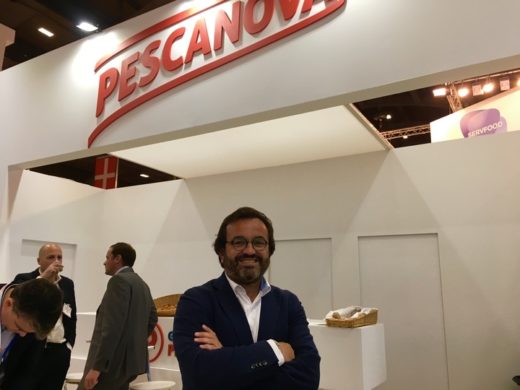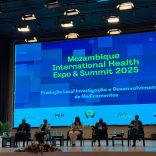Mozambique: Business sector puts forward six key reforms to government
Pescanova invests US$46.3 million to renew fleet in Mozambique, Nambia

Undercurrent News / Ignacio Gonzalez Hernandez, Grupo Nueva Pescanova's CEO
Spanish vertically integrated firm Grupo Nueva Pescanova will invest €42.5 million ($46.3m) to renew its fleet in Africa.
This comes as part of its 2020 strategic plan, which also foresees expanding sales in the US retail market, Ignacio Gonzalez Hernandez, the firm’s CEO, told Undercurrent News.
Following the capital increase approved last month, the firm plans to invest a total of €125m in capital expenditure, which includes its new research and development center called Pescanova Biomarine Center, a new IT integrated system, maintenance and fleet renewal. The capital expenditure will be made in line with the firm’s 2017-2020 strategic plan.
The investment to renew Pescanova’s fleet totals €42.5m. Depending on the agreements with shipyards, the firm will build seven to nine vessels in Namibia and Mozambique, Gonzalez told Undercurrent.
“This company hasn’t built vessels for the last 30 years or more, and the fact that we are returning to build vessels is a clear sign that Pescanova is back, problems are behind us and the firm is looking at the future with its new [strategic] plan,” Gonzalez said.
Nueva Pescanova’s vertical integration, strong brand and operations across both wild catch and aquaculture give it a strong business model, said the CEO.
“We will launch the project in June. We have talked to four to give shipyards so far, but we will talk with more companies,” Gonzalez said, referring to the firm’s fleet renewal. The group will ideally prefer to commission Spanish shipyards, if possible, he added.
US retail expansion
Pescanova’s turnover in the US totals about $100m, which accounts for 10% of the firm´s total revenue. The firm recently hired a new CEO in the US to develop the business expansion there.
According to its strategic plan for 2020, Pescanova plans to sharply increase its business in the North American market, with a particular focus on rising sales in retail and investing more in its brand.
“This company hasn’t built vessels for the last 30 years or more, and the fact that we are returning to build vessels is a clear sign that Pescanova is back, problems are behind us and the firm is looking at the future with its new [strategic] plan”
The company can grow in the US because of the size of the country and its strong activity in several Latin American countries, Gonzalez said.
“At present we do a lot of trading and operations where the brand doesn’t have a value, so we intend to step up our efforts in the retail sector,” Gonzalez said. So far the firm has sold its products to wholesaler Costco in the US, and is in process of expanding sales to other supermarket chains, he said.
He highlighted that — in order to achieve this objective — the firm would invest in its exports of mahi mahi from Peru, tootfish from Argentina and farmed shrimp from Latin America, particularly Guatemala and Ecuador.
Nueva Pescanova farms 20,000 tons of shrimp in Guatemala, Ecuador, Honduras and Nicaragua. It owns 18 fishing vessels in Argentina, which fish shrimp, Illex squid and tootfish and sources mahi mahi in Peru.
“[In Argentina] we are always looking for opportunities to expand our operations there, but for the moment it is not in the plan,” Gonzalez said.
The firm also farms 2,500t of tilapia in Brazil, up from 1,000t two years ago. The firm has potential to increase its sales in Latin America, particularly in Brazil and Peru, because of the higher fish consumption, Gonzalez said.
Gonzalez also said that the firm’s sales to China and South Korea are growing. In China it is selling mainly shrimp — from Ecuador — to wholesalers, but it is also starting to sell to retailers, Gonzalez said.
He added that the firm’s shrimp production in Ecuador would be improved in terms of efficiency, but it had physical limitations to grow in size.
“We have 8,000 hectares of ponds [in Latin America],” Gonzalez pointed out.
Nueva Pescanova is also always considering opportunities to increase its fishing operations, where they would arise, he added.
“In Africa we are present in Namibia and South Africa, where we have 15 vessels and we catch 30,000 tons of hake. We also are in Mozambique, where we fish prawns [shrimps], and in Angola we catch deep sea prawns [shrimps] and red shrimps,” Gonzalez said.
In Mozambique, the company catches approximately 50% of the total allowable catch (TAC), while in Namibia it catches about 20% of the country’s hake TAC Gonzalez said, adding that they had to defend their quotas in Namibia.
According to Gonzalez, Nueva Pescanova’s operations in Namibia generate about 2,200 jobs. The catch is processed in the country, before being sent for retail in Europe.
“We also have interesting sales in South Africa,” said Gonzalez.
Nueva Pescanova’s research and development centre in Spain, which will start to be constructed in June and should be completed by the end of 2018, will be key in exploring new origins, improve the firm’s aquaculture practices, investigate new species, also analysing turbot, shrimp and tilapia farming.
As part of the group’s strategic plan, the firm will also expand more in southern European markets, innovate and produce more refrigerated (chilled) products rather than frozen packages.
By Matilde Mereghetti












Leave a Reply
Be the First to Comment!
You must be logged in to post a comment.
You must be logged in to post a comment.